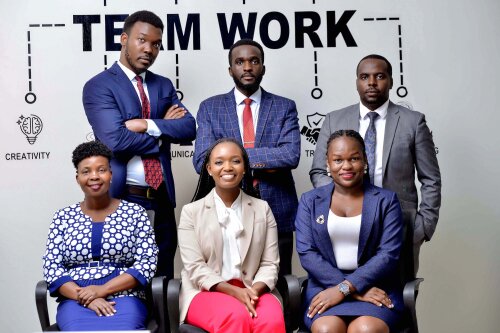Best Housing, Construction & Development Lawyers in Uganda
Share your needs with us, get contacted by law firms.
Free. Takes 2 min.
Free Guide to Hiring a Real Estate Lawyer
Or refine your search by selecting a city:
List of the best lawyers in Uganda
About Housing, Construction & Development Law in Uganda
Housing, Construction & Development law in Uganda encompasses various legal frameworks that have been established to regulate the planning, construction, maintenance, and use of buildings and infrastructure. The sector is governed by a collection of laws, statutes, and guidelines aimed at ensuring the safety, efficiency, and sustainability of development activities. This body of law covers aspects ranging from land acquisition, planning permissions, environmental regulations, building controls, to property ownership rights. Due to continuous urbanization and development efforts, this area of law is crucial in managing the growth of cities and rural areas efficiently.
Why You May Need a Lawyer
There are many situations where legal expertise might be necessary in the field of Housing, Construction & Development in Uganda:
- Land Acquisition: Resolving disputes over land ownership or navigating the purchase process.
- Contracts and Agreements: Drafting and reviewing construction contracts, lease agreements, or sale contracts.
- Regulatory Compliance: Ensuring compliance with local building codes and planning regulations.
- Environmental Issues: Addressing concerns related to environmental impact assessments or clearance.
- Dispute Resolution: Handling disputes between contractors, developers, and clients.
- Trespassing and Encroachment: Dealing with unauthorized use or encroachment on property.
Local Laws Overview
Uganda's legal framework for development is comprehensive, touching upon various stages of the construction process:
- The Constitution of Uganda: Provides for the protection of land ownership rights.
- Land Act: It outlines the handling of land administration and disputes.
- Building Control Act: Provides guidelines and standards for construction and renovations.
- National Environment Act: Requires Environmental Impact Assessments for specific projects.
- Physical Planning Act: Governs the planning and development of land and urban areas.
These laws and regulations are essential in ensuring that development projects meet legal, safety, and environmental standards.
Frequently Asked Questions
What is the process for acquiring land for development in Uganda?
Acquiring land involves identifying suitable land, conducting due diligence, obtaining consent from relevant authorities, finalizing a sale agreement, and registering the land title with the land registry.
Do I need planning permission for my construction project?
Yes, planning permission is required from the local physical planning committee to ensure that the proposed development complies with area zoning and development plans.
How can I resolve a land dispute in Uganda?
Land disputes can be resolved through negotiation, mediation, local council courts, or taking legal action through the formal court system.
What are the penalties for non-compliance with building regulations?
Penalties may include fines, demolition orders for unauthorized structures, and possible legal action leading to further sanctions.
Who is responsible for Environmental Impact Assessments?
The project developer is responsible for conducting an Environmental Impact Assessment, which must be approved by the National Environment Management Authority.
What legal documents should I prepare when developing property?
Key documents include the land title, planning permissions, construction permits, environmental clearances, and contracts with contractors and suppliers.
Can I use the property as collateral for a loan?
Yes, provided the property is free from any encumbrances and you hold a valid title deed registered with the land registry.
What rights do tenants have under Ugandan law?
Tenants are protected under tenancy agreements and laws that ensure reasonable tenancy terms and provide mechanisms for dispute resolution.
How is property inheritance handled?
Property inheritance in Uganda is governed by succession laws, where beneficiaries are determined through wills or, in the absence of a will, through legal succession processes.
What recourse do I have if a contractor defaults on a construction agreement?
You can pursue mediation, arbitration, or legal action to seek compensation or enforcement of the contract terms.
Additional Resources
Several resources and organizations can assist individuals seeking legal advice in the area of Housing, Construction and Development:
- Ministry of Lands, Housing and Urban Development: Provides guidance and support on various housing and land issues.
- Uganda Law Society: Offers referrals to legal professionals with expertise in housing and development law.
- National Environment Management Authority (NEMA): Oversees environmental compliance and impact assessments.
- Civil courts: Provide venues for resolving legal disputes related to property and construction dealings.
Next Steps
If you need legal assistance in the field of Housing, Construction & Development in Uganda, start by:
- Identifying the specific legal issue or query you need help with.
- Consulting with a reputable lawyer or law firm experienced in Ugandan property law.
- Gathering all necessary documents and information that may be relevant to your legal matter.
- Consider consulting with governmental bodies or seeking mediation for dispute resolution before pursuing court action.
Taking these steps will ensure you are well-prepared and informed when seeking legal guidance for your housing and construction-related needs in Uganda.
Lawzana helps you find the best lawyers and law firms in Uganda through a curated and pre-screened list of qualified legal professionals. Our platform offers rankings and detailed profiles of attorneys and law firms, allowing you to compare based on practice areas, including Housing, Construction & Development, experience, and client feedback.
Each profile includes a description of the firm's areas of practice, client reviews, team members and partners, year of establishment, spoken languages, office locations, contact information, social media presence, and any published articles or resources. Most firms on our platform speak English and are experienced in both local and international legal matters.
Get a quote from top-rated law firms in Uganda — quickly, securely, and without unnecessary hassle.
Disclaimer:
The information provided on this page is for general informational purposes only and does not constitute legal advice. While we strive to ensure the accuracy and relevance of the content, legal information may change over time, and interpretations of the law can vary. You should always consult with a qualified legal professional for advice specific to your situation.
We disclaim all liability for actions taken or not taken based on the content of this page. If you believe any information is incorrect or outdated, please contact us, and we will review and update it where appropriate.
Browse housing, construction & development law firms by city in Uganda
Refine your search by selecting a city.
















